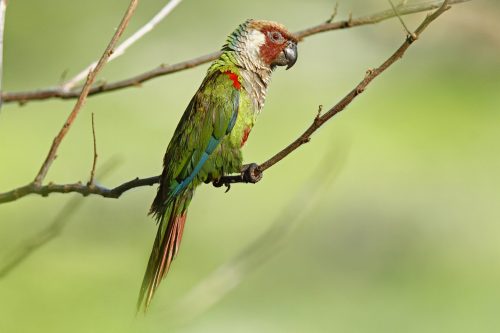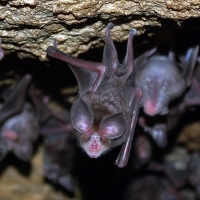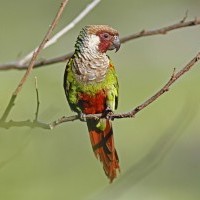CLP annual reports outline the various capacity building components of the programme and the achievements accomplished by CLP alumni.
In recent years CLP has produced reports to demonstrate the impact which the programme has been having in delivering support and mentoring to CLP alumni, which is in turn making a valuable contribution to the conservation of threatened species and habitats. Detailed reports from individual projects funded by CLP can be viewed by searching under Supported Projects.

2023 Annual Report
Our 2023 Annual Report provides an overview of our latest activities and impact, including our 2023 Conservation Team Awards (our flagship annual small-grant scheme), key conservation highlights, career placements, and regional and international training courses. The report outlines our unique efforts to empower and support early-career conservation leaders in their work preserving at-risk biodiversity worldwide, including: obtaining crucial information new to science about the Santa Fe frog in Argentina; establishing a new NGO focused on large mammal conservation in Brazil; and uncovering the conservation status of a rare gecko in Nigeria as well as the discovery of two possible new gecko species.Download File

2022 Annual Report
Our 2022 Annual Report provides an overview of our latest programmatic activities, including our 2022 Conservation Team Awards (our flagship annual small-grant scheme), internships, scholarships & placements, and regional & international training courses. Our previous award-winners around the world are leading crucial conservation actions to protect threatened biodiversity worldwide, including strengthening the protection area status of the Sui River Forest Reserve habitat of the critically endangered squeaker frog, discovery of both the first ever female mollinedia dolichotrichain flowering plant in Brazil as well as eight new invertebrates in Sataplia-Tskaltubo Karst Caves, Georgia.Download File

2021 Annual Report
Our 2021 Annual Report provides an overview of our latest programmatic activities, including our 2021 Conservation Team Awards (our flagship annual small-grant scheme), internships, scholarships & placements, and regional & international training courses. Our previous award-winners around the world are leading crucial conservation actions to protect threatened biodiversity worldwide, including the creation of a new management plan for Brazil's largest coastal Marine Protected Area and key steps towards saving the velvet scoter duck from the brink of extinction.Download File

2020 Annual Report
Read our 2020 Annual Report to find out about our latest programmatic activities, including our 2020 Conservation Team Awards (our flagship annual small-grant scheme), internships, scholarships & placements, and regional & international training courses. We are also delighted to report that our previous award-winners around the world continue to deliver noteworthy successes, including the discovery of two new species of frogs in Colombia; increasing numbers of critically endangered parakeets in Brazil; and the creation of Guyana’s first Important Bird and Biodiversity Area.Download File

2019 Annual Report
This report provides a summary of activities and outcomes achieved in 2019 and describes how CLP has started to develop and expand its presence since receiving a new grant from Arcadia – a charitable fund of Lisbet Rausing and Peter Baldwin – which will support CLP over the next five years (2019-2024). Key highlights in 2019 include the selection of three new projects and the successful completion of 15 projects funded in previous years, while 38 more people have been trained through our courses to build further capacity for conservation in their home countries. As you will find in this report, our alumni have been delivering outstanding results for conservation, including the discovery of a new species of primate in Brazil and the establishment of a new Important Marine Mammal Area in Indonesia.Download File

2017 ANNUAL REPORT
In 2017, CLP supported 22 teams to deliver projects that conserve a diverse spectrum of species and habitats. Impacts across the year include support with the designation of a new World Heritage Site, improving legislation to protect albatross and dolphins and working with communities to reduce human-wildlife conflict.Download File

2016 Annual Report
Our 2016 annual report includes many examples of how CLP alumni are giving back to the programme and supporting each other. It also contains an impressive number of career accomplishments, new discoveries and the expansion of a marine protected area. Ample evidence of genuine conservation impact!Download File

2015 Annual Report
Throughout 2015 CLP undertook an array of activities and saw some outstanding project achievements, including new discoveries and overcoming threats to biodiversity. We welcomed over 80 alumni into our network through our conservation awards and internships and with CLP support, several have received accolades in recognition of the enduring outcomes of their work.Download File

2014 Annual Report
In 2014, CLP continued to build a strong, global alumni network of conservationists, funded 25 conservation projects and increased opportunities for young conservationists to develop their careers and pursue professional goals.Download File

2013 Annual Report
The 2013 CLP Annual Report summarises how we are building the capacity of conservationists around the world and includes examples of successful work being undertaken by CLP alumni.Download File

2012 Annual Report
The outcomes of CLP-funded activities including Team Conservation Awards, internships, mentoring and training workshops, together with a list of CLP alumni publications can be viewed in the our 2012 Annual Report.Download File

CLP Alumni Assessment 1990-2005
In 2005 CLP made an assessment of its impact on conservation and capacity development of young conservationists over 15 years. The assessment looked at the career paths of CLP award winners, the proportion of team members still working in a conservation-related field, and considered awardees significant conservation achievements. Results showed that the majority of team members have remained working in conservation and that approximately half of those individuals have continued to work in the region or with the species or habitat their project studied. Sustainable conservation activities and achievements have been widely accomplished proving that CLP activities lead to long term capacity development and conservation benefit.Download File




